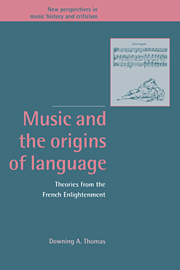Book contents
- Frontmatter
- Contents
- Acknowledgements
- Introduction
- 1 Music and language
- 2 Origins
- 3 Music theory and the genealogy of knowledge in Condillac's Essai sur l'origine des connaissances humaines
- 4 Music and original loss in Rousseau's Essai sur l'origine des langues
- 5 Sensible sounds: music and theories of the passions
- Conclusion
- Bibliography
- Index
5 - Sensible sounds: music and theories of the passions
Published online by Cambridge University Press: 15 December 2009
- Frontmatter
- Contents
- Acknowledgements
- Introduction
- 1 Music and language
- 2 Origins
- 3 Music theory and the genealogy of knowledge in Condillac's Essai sur l'origine des connaissances humaines
- 4 Music and original loss in Rousseau's Essai sur l'origine des langues
- 5 Sensible sounds: music and theories of the passions
- Conclusion
- Bibliography
- Index
Summary
By examining the place of music in “ideology” – by which I mean both Condillac's study of the development and structure of knowledge, preparing Destutt de Tracy's coinage of the term, and at the same time the more recent sense of a systematic cultural network of meanings – I have sought to understand the place of music within specific discourses in the eighteenth century while attempting to rekindle an interest in “musicology” as cultural discourse. Having discussed the texts of Condillac and Rousseau in some detail, I will now broaden the scope of my analysis. I want to shift the focus of my inquiry from the primordial semiotic bond between the voice and passion at the origin of society to the connection between music and passion in the eighteenth-century present. A relation to the present was always implicit in Condillac's Essai sur l'origine des connaissances humaines and Rousseau's Essai sur l'origine des langues. The importance of these essays, as I have suggested, is not so much in what they tell about an original state, as in their effort to seat an anthropological discourse in the present. This discourse comes into particular focus, I argue, in medical texts and in writings on musical theater. In both these areas, music filled an epistemological gap by providing a way to discuss and represent the relationship between observable behavior and external forces, on the one hand, and inner passions on the other.
- Type
- Chapter
- Information
- Music and the Origins of LanguageTheories from the French Enlightenment, pp. 143 - 172Publisher: Cambridge University PressPrint publication year: 1995



